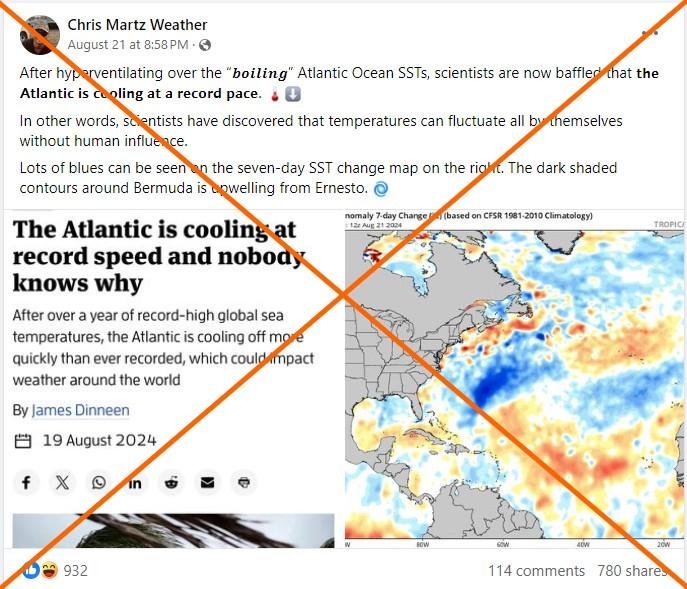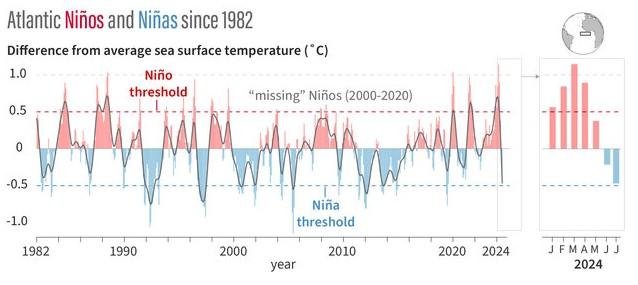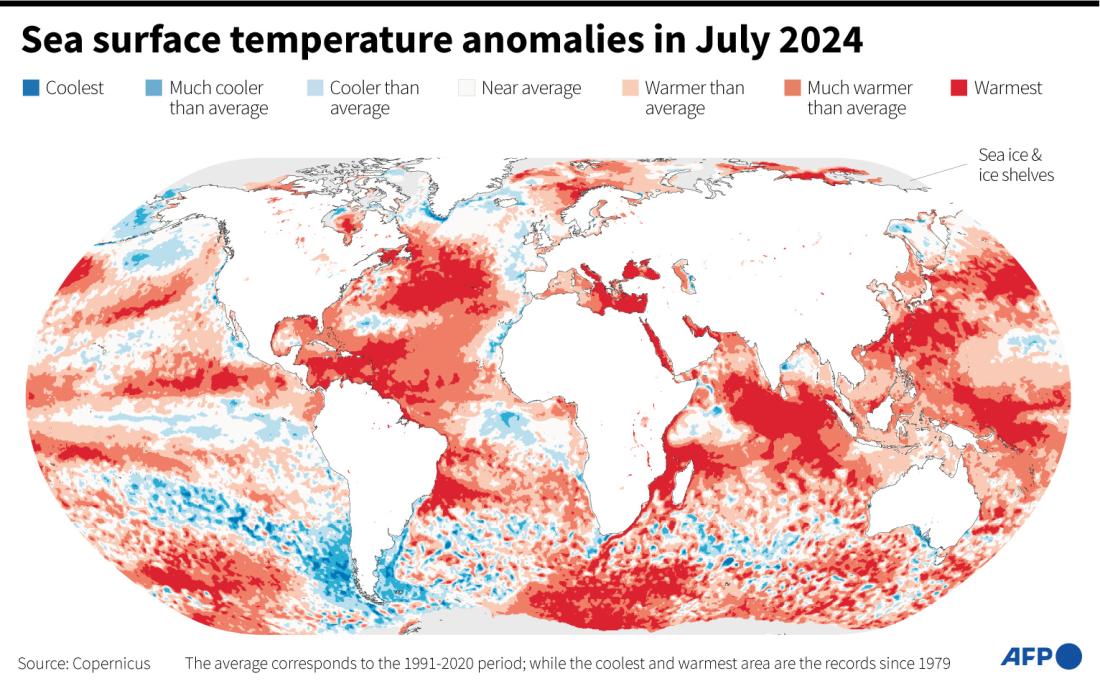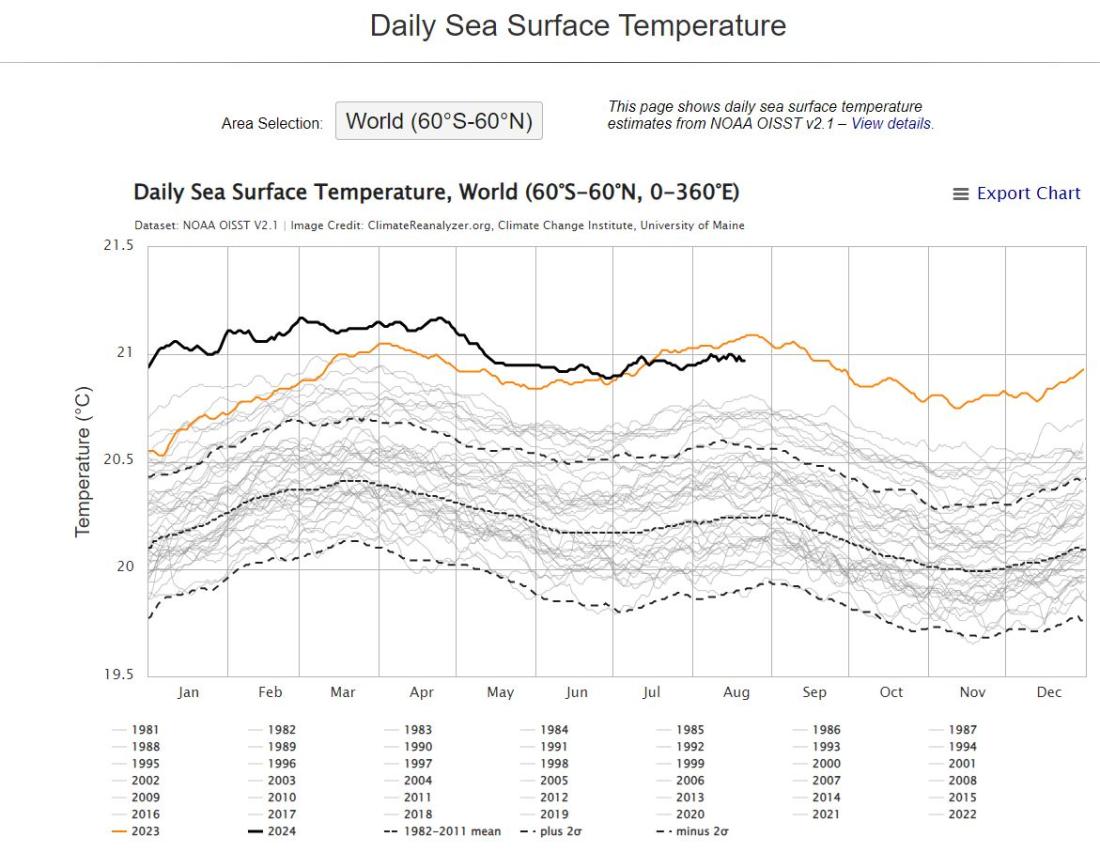
Report on equatorial Atlantic cooling does not negate climate change
- This article is more than one year old.
- Published on August 28, 2024 at 18:22
- 4 min read
- By Gaëlle GEOFFROY, AFP France, AFP Canada
- Translation and adaptation Gwen Roley
"After hyperventilating over the 'boiling' Atlantic Ocean SSTs, scientists are now baffled that the Atlantic is cooling at a record pace," says an August 21, 2024 Facebook post.
Similar claims that a sudden drop in Atlantic temperatures has stumped scientists spread across X, TikTok, Instagram and Threads -- including in French and Greek.


The posts are the latest to claim climate change is exaggerated or a hoax, even though there is scientific consensus that human activity is warming Earth (archived here).
Some posts feature screenshots of the headline: "The Atlantic is cooling at record speed and nobody knows why." The New Scientist published the article August 19 based on the NOAA findings.
The August 14 publication from the American meteorological agency (archived here) discusses how, following an unusually warm winter and spring, the equatorial Atlantic experienced colder-than-average sea surface temperatures (SST) in summer 2024.
"Never before in the observed record has the eastern equatorial Atlantic swung so quickly from one to another extreme event," the report says.
Franz Philip Tuchen, the author of the report (archived here), told AFP the claims online are "misinterpretations" suggesting the whole Atlantic is colder than normal, which is not what he found.
He added that his findings do not negate global warming.
"This cold event in the equatorial Atlantic should not be seen as a sign of reduced global warming, but rather a short-term deviation on top of any global warming signal," Tuchen said in an August 22 email.
AFP contacted the author of the New Scientist article for comment. A response was not forthcoming, but the British outlet on August 22 amended its headline to say: "Part of the Atlantic is cooling at record speed" (archived here).
'Amplification' of normal cooling
Tuchen said in the NOAA article that, if the below-average temperatures continue beyond August, there could be an Atlantic Niña -- the cold phase of a natural climate pattern similar to the larger El Niño and La Niña phenomena in the Pacific (archived here).
Equatorial Atlantic sea surface temperatures are typically easy to predict, as they follow a seasonal cycle. But waters in the area can sometimes be warmer or cooler than average, leading to an Atlantic Niño or Niña, which can cause fluctuations in weather patterns.
"This potential Atlantic Niña ... can be seen as an amplification of the normal cooling that happens during this time of the year every year," Tuchen said.

In early 2024, before the precipitous drop in sea surface temperatures, readings in the equatorial Atlantic were the highest above average since 1982.
Tuchen told AFP many regions outside the equatorial Atlantic continue to be warmer than average. In June 2024, other researchers at NOAA said the northern part of the ocean was "running a fever" (archived here).
Oceans warming
Michael McPhaden, an oceanographer at NOAA (archived here), told AFP a possible Atlantic Niña does not mean global surface and sea temperatures are decreasing.
"Cooling in the equatorial Atlantic does not contradict the fact that July 2024 was the hottest month ever recorded on Earth due to the relentless rise of greenhouse gas concentrations in the atmosphere," McPhaden said in an August 22 email.
According to NOAA, average global surface temperatures in July 2024 were 1.21 degrees Celsius (2.18 degrees Fahrenheit) above the 20th-century average (archived here).
Oceans are also warming, increasing humidity in the atmosphere and creating more unstable weather (archived here).
In March 2024, the European observatory Copernicus (archived here) reported a new average sea surface temperature record of 21.07C (69.93F), excluding the poles.
In 2023 and 2024, global sea surface temperature means were at record levels, according to NOAA data synthesized by the University of Maine (archived here).


While researchers are still investigating the effects of climate change on El Niño and La Niña patterns, studies suggest rising temperatures could exacerbate their effects (archived here).
Read more of AFP's reporting on misinformation about climate change here.
Copyright © AFP 2017-2026. Any commercial use of this content requires a subscription. Click here to find out more.
Is there content that you would like AFP to fact-check? Get in touch.
Contact us




